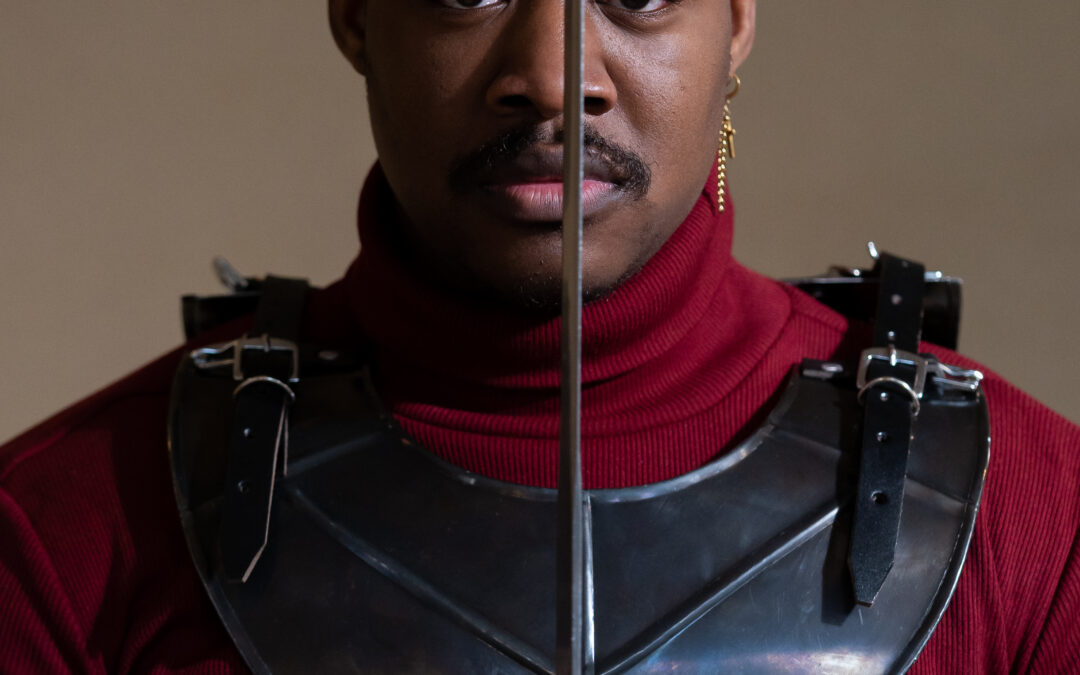(Christopher Marquis Lindsay as Henry V. Photo by Matthew Omilianowski of TOC Creative.)
By Montague Gammon III
The greatest coach-to-underdogs pre-game speech the world has ever heard, or can ever expect to hear, is part of what makes Shakespeare’s c. 1599 history play, Henry V (more formally titled The Chronicle History of [or The Life of] Henry the Fifth) great.
It has “probably the earliest example of ‘Undercover Boss’ in literature,” noted director Tom Quaintance, in a person-to-person chat about the upcoming production at the Virginia Stage Company, where he is Producing Artistic Director. It’s the only play in which “Shakespeare wrote scenes in French,” Quaintance pointed out. (Since those are love scenes, they’re easy to follow without knowing the exact words.)
As if to counteract that non-Anglo interpolation, there’s an uncommon amount of English prose in the script, which makes the play all the more accessible.
“We’re just people,” is an unspoken message Quaintance felt when he first encountered the play in Kenneth Branagh’s 1989 film version.
For all its presentation of titled and royal characters, there’s another, contrasting, important element of this time-condensed recounting of a bit of the Hundred Years’ War, that on and off 1337-1453 broil between England and France, when the Kings of England also claimed the French throne.
That element is “How much care Shakespeare pays to the everyday soldier and the people whose lives are on the line,” noted Quaintance.
Shakespearean trained Anthony Stockard, head of the Drama and Theater Program at Norfolk Stage University, whose students and alumni turned professional actors are prominent in this co-production of VSC and Norfolk State University Theatre Company, was included in that chat with Quaintance. Stockard is, Quantance explained in a later email, acting as a coach and mentor for his students and alums..
Stockard said, “A king could be a common man…It is the people who are the heroes. They are the ones who are contributing significantly.. There’s so much humor, there’s so much love in what is usually the tense war struggle, the power struggle, and it is unique in that way.”
Henry V is, most especially, a “celebration of what makes theatre a unique experience,” Quaintance noted. “The coming together, the action between the audience and the performer,” enables the transmutation of huge real world events, such as the clash of battling armies, into events that fit the small space of a stage.
“Dynamic story telling,” is a feature of Henry V, Stockard said, in explaining his affection for the play.
“It’s just a beautiful language,” Stockard said. ”It’s an intense experience when actors build the bridge of understanding and paint the images for the audience…There’s something about [using] language to transport instead of spectacle…”
Henry V admits in a Prologue (one of the few instances where, perhaps, Shakespeare the author himself speaks) that the audience must use its “imaginary forces” to visualize great events, to “piece out our imperfections with your thoughts.”
Central to the play is the 1415 Battle of Agincourt, where Henry’s army, tired, ill, short on supplies, faced off against a fresh, eager French army, supplied with healthy fighting men numbering many times the force of the English.
Henry, disguised, walks though his camp the night before the battle, anonymously interacting with his soldiers, who are aware of the fearsome odds against them.
In the morning Coach Henry speaks to those who wish for a larger force, and proclaims in ringing tones that their very disadvantage makes their struggle a source of greater honor. Henry uses humor, even getting laughs, “to rally his men,” Quaintance said, while vowing that he, the King, and they are fighting side by side as “this happy few, this band of brothers,” promising that in future days those who survive will have a special place in history “to the ending of the world.”
It’s not only the greatest pep talk ever, but acknowledged as one of the greatest speeches Shakespeare ever wrote.
The play does not reveal that the historical Henry probably knew what elements of strategy were on his side in a case of “They have us right where we want them”, in modern lingo.
They faced the French from a position bounded by forest, which narrowed the front as the French knights charged them. The French cavalry would be charging across a muddy field that would further sap their momentum as they rushed into a lethal hail of arrows from the English archers, whose longbows fired far faster than the French infantry’s crossbow. It was the equivalent of automatic AK-47’s against bolt action, fire and reload and only than fire again, Mausers.
In what was apparently a novel defense, the English archers had build a barricade of sharpened stakes stuck in the ground and pointed at the mounted French attackers.
French casualties outnumbered English losses on such an unimaginable scale that Henry and his nobles were assured that God had fought on their side.
Henry is then free to woo Princess Catherine of France, to further secure his claim on the French throne. There’s even a bit of bawdy humor arising from her mistaking innocent English words for similar sounding but very improper French words.
Of course, subplots abound, grounding historically important events in the lives of the foot soldier and the citizen at home.
The production features non-period costumes by Jeni Schaefer, and a stage that thrusts out into what is usually audience space.
Henry V closes with the Chorus – a role Quaintance and Stockard play in alternate performances – proclaiming that:
“Our bending author hath pursued the story,
In little room confining mighty men,
Mangling by starts the full course of their glory.
Small time, but in that small most greatly lived
This star of England.”
WANT TO GO?
Henry V by William Shakespeare
April 13-30
Presented by Virginia Stage Company and Norfolk State University Theatre Company
Wells Theatre
757-627-1234




